The University of Memphis football program is auditioning. Surely you’ve heard the whispers — loud as sirens — that the Big 12 Conference is evaluating expansion. One of the fabled “Power Five” conferences that award member schools the largest stacks of TV and sponsorship revenue, the Big 12 has had but 10 members since Missouri and Texas A & M departed for the SEC before the 2013-14 academic year. In the interest of gaining ground — particularly when it comes to revenue — on college football’s other conference titans (SEC, ACC, Big Ten, and Pac 12), the Big 12 is accepting hugs and kisses from schools desperate to land one of possibly four (but at least two) invitations for membership.
This, friends, is the U of M’s last, best chance to become a member of the NCAA’s ruling elite. (At least until further expansion creates “Super-Power Conferences.” Just wait. It’ll happen.) And qualifications for this form of exclusivity are wrapped in and around football. So consider the 2016 Tiger season a 12-game (hopefully 13-game) casting call. In the spirit of the league Memphis is pursuing, here are 12 storylines to follow.
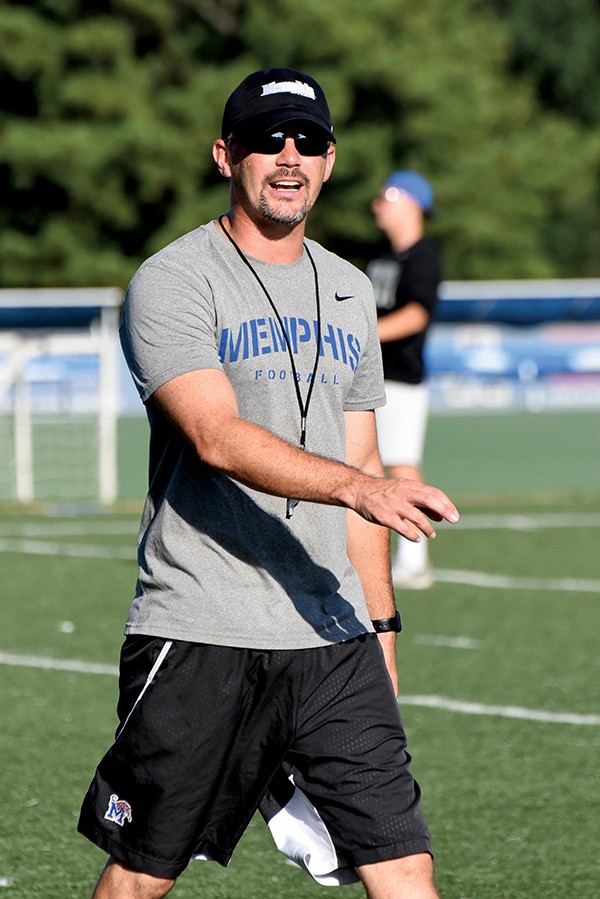
Mike Norvell promises fast-playing Tigers this season.
Missing Pieces: Let’s get this out of the way. Several familiar (and historically significant) names from the 2015 season are no longer on the Tiger roster. Quarterback Paxton Lynch — a first-round NFL draft pick — has essentially taken Peyton Manning’s spot on the roster of the Super Bowl champions. Also gone are an all-conference tight end (Alan Cross), all-conference tackle (Taylor Fallin), a pair of Lynch’s favorite targets (Mose Frazier and Tevin Jones), and a running back who finished second on the team last season with 389 rushing yards (Jarvis Cooper). And, oh yeah, coach Justin Fuente — architect of the most significant turnaround in the program’s history — is now the boss at Virginia Tech. To act as though the 2016 Tiger season will be merely a continuation of last year’s success would be to insult the legacy of these departed difference-makers. The hope must be that the bar has been raised and secured high enough for new difference-makers to emerge.
A Golden Era Is Upon Us (Maybe): The Tigers won more games over the last two seasons (19) than in any other two-year period since football was first played by the U of M in 1912. With seven wins this season, a new standard would be established for a three-year period. (The Tigers won 25 games from 1961 through 1963.) College football absolutely drips with the words “tradition rich.” There are programs, sadly, that are tradition poor. Success has been infrequent and scattered over the 104 years Memphis has suited up a football team. What we’re seeing these days — remember that 15-game winning streak and beat-down of Ole Miss? — is the closest the Tiger program has come to the dawn of a significant era. Can it be golden?
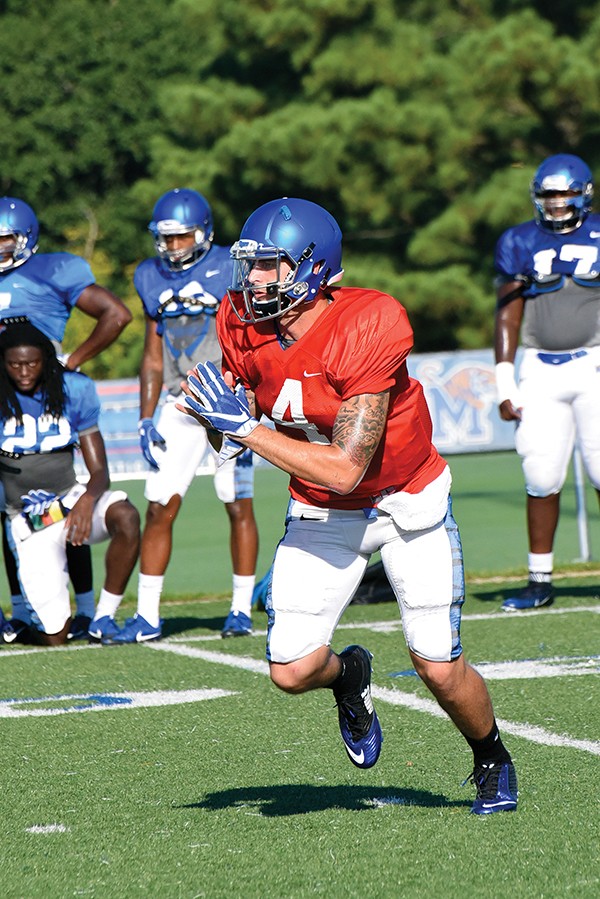
The Tigers gear up for a (with hard work and a little luck) successful season.
The Norvell Way: Filling a departed coach’s shoes has not been difficult, historically, at Memphis. Typically it’s more like flip-flops, with a broken strap. But following Fuente will be different. Mike Norvell is the youngest of 128 coaches in FBS. At age 34 (he turns 35 in October), he’s less than two years older than DeAngelo Williams. The list of former wide receivers (like Norvell) who have found success as head coaches is a short one. But you’ve heard of Bear Bryant. (Hall of Famer Raymond Berry took the New England Patriots to Super Bowl XX; we’ll ignore the result.) Norvell insists his Tigers will play fast, particularly on offense where he built his credentials as a coordinator under Todd Graham, most recently at Arizona State.
“We’re gonna push the pedal to the metal, play as fast as we can,” Norvell says. “The way we practice and train, everything we do is focused on tempo. It’s an offense built for playmakers, and we have some guys here who can be very impactful.”
Among the playmakers Norvell considers integral this fall are tailbacks Doroland Dorceus (698 yards as a sophomore last year) and Darrell Henderson (a freshman), multipurpose threat Sam Craft (back from the basketball court), and receivers Anthony Miller and Phil Mayhue. With a pair of veterans — Trevon Tate and Gabe Kuhn — manning the tackle positions up front, the Tiger offense has the potential for star power. But if it’s going to approach 40 points a game (like the 2015 edition), a rookie will lead the way.
Paxton Who? “When I got here,” says Norvell, “I told the guys, if there’s one position I’ll guarantee competition, it’s quarterback.” Junior-college transfer Riley Ferguson — a member of the Tennessee program in 2013 — took the lead last spring in the Tigers’ quarterback derby, and last week Norvell named him the starter for Saturday’s opener.
Ferguson has size (6’4″, 190 lbs.) and put up solid numbers last fall at Coffeyville (KS) Community College: 67.8 completion percentage, 326.9 yards per game, and 35 touchdowns. As Norvell puts it, the Memphis quarterback will be “the guy who can truly manage the offense . . . play within the system.”
Ferguson is blessed with arm strength — a must at this level — but it’s a more intangible quality that has impressed his coach. “He came in and had a really nice mentality in how he positioned himself with the team,” Norvell says. “Guys like him as a person, but when he’s on the field, it’s all business.”
And why exactly is Ferguson a Memphis Tiger? “[Norvell] is a young coach, and I feel like I connected with him,” says Ferguson, who had been disappointed with his options after Coffeyville until Memphis swept in. “I felt I could be open with him and tell him my story, what I’ve been through. When he showed me the offense, that made me love [Memphis] even more. There’s nothing a defense can do to stop it. The only time the defense can be right is if I make a wrong read or they bring a pressure we can’t pick up. Based on the read-aspect of the offense, it’s unstoppable. And very fast.”
Fill Those Seats! While the Tigers were winning those 19 games the last two seasons, the U of M sold just under half a million tickets for 12 games at the Liberty Bowl. (465,917 to be exact, or an average of 38,826 per game.) Last year’s attendance total of 262,811 established a new record for a six-game home season, and the average attendance of 43,801 was the highest since the stadium opened in 1965.
These are great numbers by the standards of Memphis football, but they must continue to grow. With new seatback sections added, the Liberty Bowl’s capacity is now 56,862. If the program is to convince the Big 12 it’s worthy of membership, 50,000 fans on game day should not be exceptional. Consider: Last November, 55,212 fans showed up to see Memphis play Navy. (Navy! No SEC team on the other sideline.) It was the largest crowd to see a Tiger football game without an SEC foe since 1989. It’s not just the team auditioning folks.
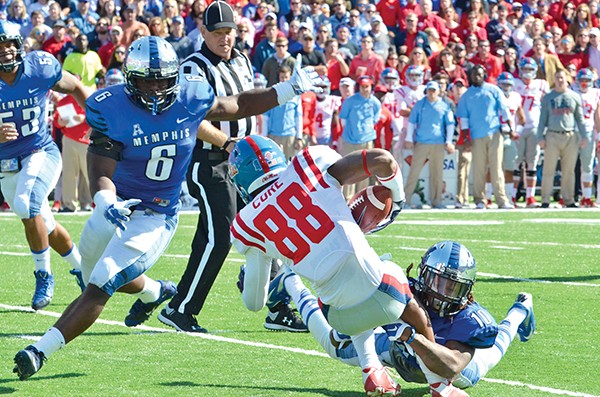
Fall is for football, and, as the season approaches, Coach Norvell and the Tigers are pushing themselves to bring us a heaping helping of wins.
Miller Time: A year ago at this time, Fuente described wide receiver Anthony Miller as “different from anyone else we have.” And Miller had yet to catch a pass in college. As a sophomore, the pride of Christian Brothers High School hauled in 47 passes and averaged 14.7 yards per catch. He caught five touchdown passes but was one of 12 players to reach the end zone on the receiving end of a Lynch toss.
Look for Miller to be a more frequent target this season and for numbers that will capture more national attention. Ferguson has already described Miller as “the best receiver I’ve ever thrown to.” (The Memphis program has seen only one 1,000-yard receiver: Isaac Bruce in 1993.) Ferguson points to junior Phil Mayhue as another valuable target, a possession receiver who will extend drives with his route running and sure hands. When asked about Daniel Montiel, Ferguson says, “We’re gonna use the tight end a tremendous amount.”
Kickers Can Be Stars: Close football contests are often won (and lost) with the kicking game. Memphis has featured the American Athletic Conference’s Special Teams Player of the Year all three years of the league’s existence. Punter Tom Hornsey took the prize in 2013, and kicker Jake Elliott has earned the honor each of the last two seasons. Elliott and punter Spencer Smith were two of the four Tigers named first-team All-AAC after the 2015 campaign. Elliott converted 23 of 28 field-goal attempts last year (including nine of at least 40 yards), and Smith averaged 47.2 yards per punt, with 18 traveling more than 50 yards and 10 punts that pinned the Tiger opponent inside its own 10-yard line. Elliott has his sights set on the Lou Groza Award, given annually to the nation’s top kicker and first won by the U of M’s Joe Allison in 1992.
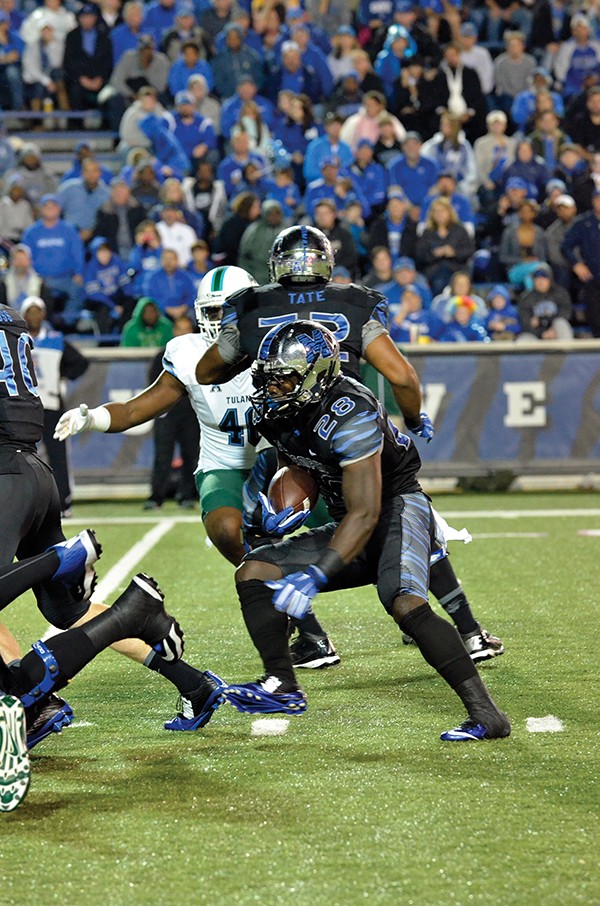
Defensive Matters: The 2015 Tigers set a program record by scoring 522 points (40.1 per game). And it’s a good thing, because the Memphis defense gave up 355 (27.3 per game), an increase of 40 percent over the previous season (253 points). This is a trend Norvell and new defensive coordinator Chris Ball would like to reverse. When asked about playmakers on the defensive side of the ball, Norvell starts with linebacker Genard Avery and safety Jonathan Cook (a transfer from Alabama).
“Genard is a very versatile player,” says Norvell, “and very explosive. He maxed out the other day with a 450-pound bench and 600-pound squat. He’s one of the strongest human beings I’ve been around. He’s moving better than ever. Arthur Maulet is a guy who can be a playmaker for us. I like our defensive front. We’ve got guys up there who can create havoc. [Defense] is our most experienced group, and they have a better sense of what they can do.”
Senior linebacker Jackson Dillon has compiled 20.5 tackles behind the line of scrimmage over his three seasons as a starter and aims to finish his college career with a third straight winning season, something that hasn’t happened at Memphis since 2003-05. “This is probably the best defense I’ve been a part of,” says Dillon. “Getting off the field after third down, that’s the biggest priority. Winning first and second down.”
Circle the Dates: The Tigers have an early bye week (Week 2) but seven home games. They travel to Ole Miss on October 1st (after beating the Rebels at home last year) and host Houston on November 25th (after losing to the Cougars last year in Texas). The top two teams in the AAC East will visit the Liberty Bowl (Temple on October 6th and USF on November 12th), but the Tigers must face Navy and Cincinnati on the road. The Tigers need a strong start and have three winnable home games to start the campaign (SEMO, Kansas, and Bowling Green).
Ground Control: With a former receiver calling the shots, count on the Memphis offense taking to the air with regularity. But even with the departures of Cooper and Jamarius Henderson (320 rushing yards last season), the Tigers’ ground attack is versatile and deep. Junior Doroland Dorceus led the team with 661 yards a year ago and ran for eight touchdowns. In many offenses, Dorceus would be a threat for 1,000 yards. But Sam Craft is back from the hardwood for his senior season, and freshman Darrell Henderson (from South Panola High School) is expected to get his share of carries. So the Tigers could match last season’s ground production (179.5 yards per game) but without a 1,000-yard rusher for a seventh consecutive season.
Four Words: Smart. Fast. Physical. Finish. These are the areas of emphasis Norvell has implemented, and they’re not all that different from the style of play Fuente preached for four seasons (and to profound success the last two years). A fast team, Novell believes, will hit harder and more often, making for a physical style that will be felt throughout a stadium.
“We judge the finish as strictly as anything in this program,” he adds. “We want to be better at the end than we are at the beginning.” A decent strategy, whether you’re measuring a half, a game, or an entire season.
Underdogs, Now and Forever: In its annual preseason poll, voters (among media) placed the Tigers third in the AAC’s West Division, behind Houston (the overwhelming favorite) and Navy. In handicapping Big 12 expansion, BYU, Cincinnati, Houston, and UConn tend to get more affection (again, among media types) than does Memphis. The underdog status is a motivator for the Tiger coaching staff and players, but not a distracting one.
“I don’t care what [the polls] say,” Dillon says. “They’re just people in suits, making suggestions. They’re not out there at practice, sweating, working.”
“It’s not unexpected,” Norvell says. “We know there are challenges in front of us. If we continue to grow as a football team, we have a great opportunity to put ourselves in a position to be a contender. Last year, we were 8-0 and in prime position but didn’t finish the way we needed to. We’ve got to build ourselves and show that we’re worthy of the respect that’s out there. There’s an anxiety. You’re anxious for the season. You’re anxious to see the development of players, how everything comes together for this specific team. I think we have a chance to do some great things.”
The beauty of college football is that we spend a long offseason and six days a week talking about what could be, what might be, or what should be. Then game day arrives, and the young men in helmets and shoulder pads actually make something happen. Perhaps a year (or two) from now, the Memphis Tigers will be picked to finish fourth or fifth in a division of a new Big 12. Or perhaps they’ll be defending another AAC championship. For now, though, there’s football to be played. A welcome season in Memphis, Tennessee.
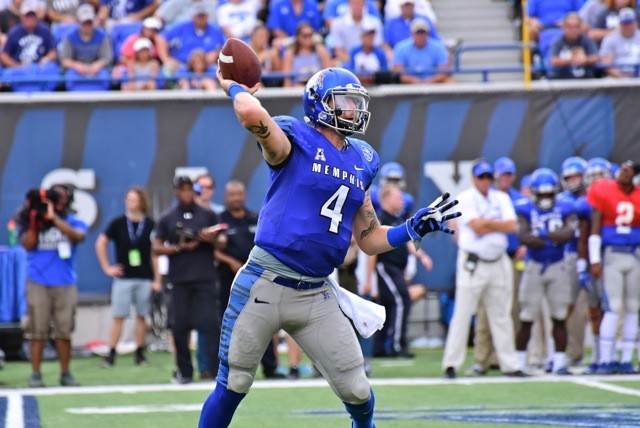 Larry Kuzniewski
Larry Kuzniewski 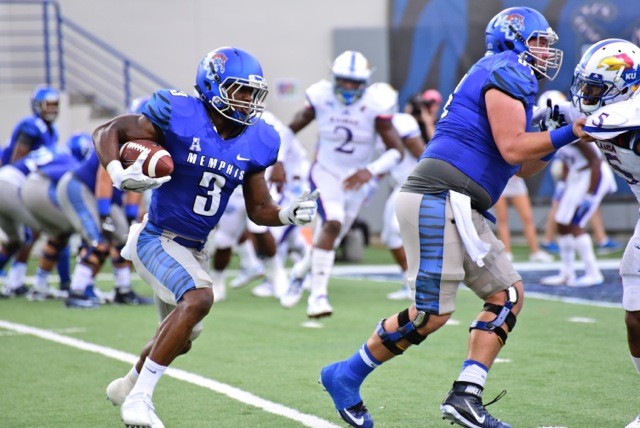 Larry Kuzniewski
Larry Kuzniewski 



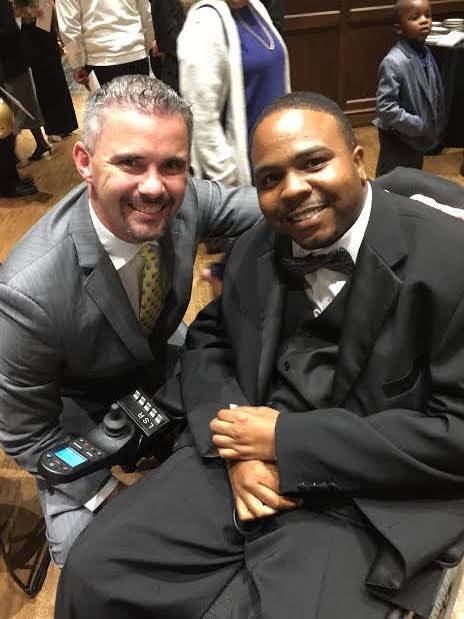
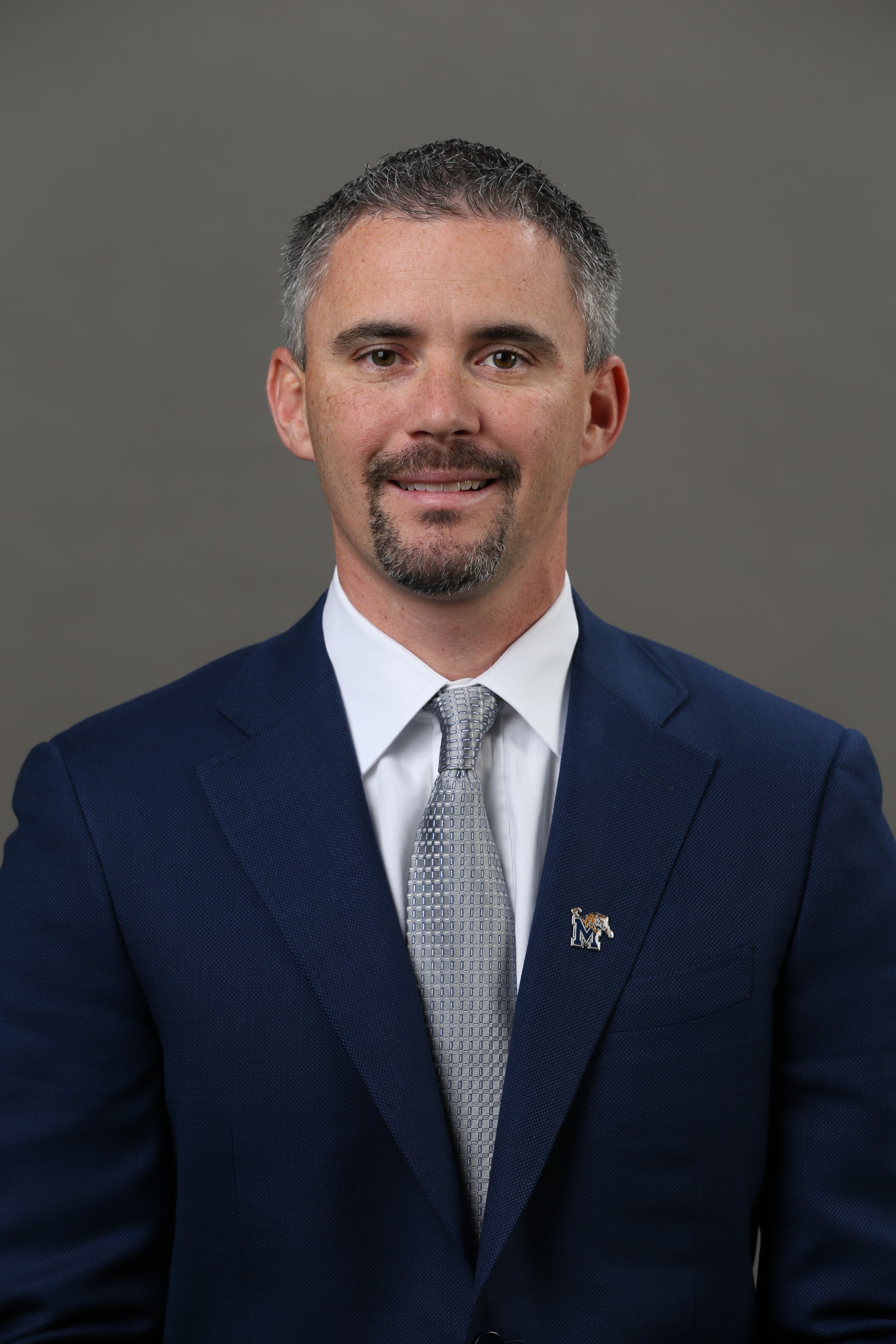 Courtesy U of M Athletics
Courtesy U of M Athletics